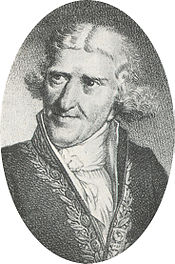Antoine Parmentier
| Antoine-Augustin Parmentier | |
|---|---|

Antoine-Augustin Parmentier
|
|
| Born |
12 August 1737 Montdidier, Somme, Kingdom of France |
| Died | 13 December 1813 (aged 76) First French Empire |
| Nationality | France |
| Fields | Agronomy |
| Known for | potato |
Antoine-Augustin Parmentier (French pronunciation: [ɑ̃twanə.oɡystɛ̃ paʁmɑ̃tje]; Montdidier 12 August 1737 – 13 December 1813) is remembered as a vocal promoter of the potato as a food source for humans in France and throughout Europe. His many other contributions to nutrition and health included establishing the first mandatory smallpox vaccination campaign (under Napoleon beginning in 1805, when he was Inspector-General of the Health Service) and pioneering the extraction of sugar from sugar beets. Parmentier also founded a school of breadmaking, and studied methods of conserving food, including refrigeration.
While serving as an army pharmacist for France in the Seven Years' War, he was captured by the Prussians, and in prison in Prussia was faced with eating potatoes, known to the French only as hog feed. The potato had been introduced from South America to Europe by the Spaniards at the beginning of the 16th century. It was introduced to the rest of Europe by 1640, but (outside Spain and Ireland) was usually used only for animal feed. King Frederick II of Prussia had required peasants to cultivate the plants under severe penalties and had provided them cuttings. In 1748 the French Parliament had actually forbidden the cultivation of the potato (on the grounds that it was thought to cause leprosy among other things), and this law remained on the books in Parmentier's time.
From his return to Paris in 1763 he pursued his pioneering studies in nutritional chemistry. His prison experience came to mind in 1772 when he proposed (in a contest sponsored by the Academy of Besançon) use of the potato as a source of nourishment for dysenteric patients. He won the prize on behalf of the potato in 1773.
...
Wikipedia
